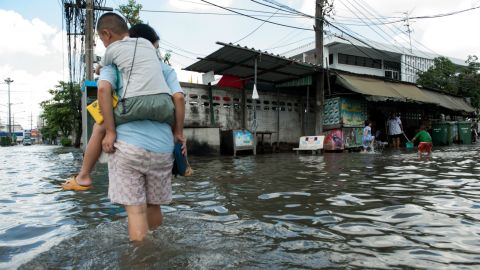Two Flaws of Human Rationality May Make It Impossible to Solve the Climate Crisis

Our planet is heating up, in case you have not heard the news. The New York Times does not put too fine a point on the extent of the trouble: “The heat accumulating in the Earth because of human emissions is roughly equal to the heat that would be released by 400,000 Hiroshima atomic bombs exploding across the planet every day.” This week, world leaders convened in Paris to try to work out a plan to get global warming under control. Two hundred countries have 12 days to hammer out an agreement to cut greenhouse gas emissions that threaten the future of life on Earth.
In working toward a climate deal, the leaders face high odds. Sweeping changes are needed, but the political will for change does not appear up to the task. The rational thing to do, of course, is to save the planet. But the way that human rationality works makes it unlikely that even the best minds working conscientiously will be able to do that.
There are two fundamental problems: a collective action conundrum, and a preference for benefits in the short term.
The collective action challenge is the most apparent issue making the Paris talks such a tall order, as a similar Copenhagen summit was six years ago. President Barack Obama acknowledged the disparate interests among the parties to the talks in his remarks on Monday, even as he sounded a note of optimism that real progress lies ahead.
The problem of climate change is a “tragedy of the commons,” a concept Garrett Hardin famously explained in a 1968 article:
The tragedy of the commons develops in this way. Picture a pasture open to all. It is to be expected that each herdsman will try to keep as many cattle as possible on the commons. Such an arrangement may work reasonably satisfactorily for centuries because tribal wars, poaching, and disease keep the numbers of both man and beast well below the carrying capacity of the land. Finally, however, comes the day of reckoning, that is, the day when the long-desired goal of social stability becomes a reality. At this point, the inherent logic of the commons remorselessly generates tragedy.
As a rational being, each herdsman seeks to maximize his gain. Explicitly or implicitly, more or less consciously, he asks, “What is the utility to me of adding one more animal to my herd?” This utility has one negative and one positive component.
1) The positive component is a function of the increment of one animal. Since the herdsman receives all the proceeds from the sale of the additional animal, the positive utility is nearly +1.
2) The negative component is a function of the additional overgrazing created by one more animal. Since, however, the effects of overgrazing are shared by all the herdsmen, the negative utility for any particular decision-making herdsman is only a fraction of -1.
Given these figures, the calculation is a no-brainer:
Adding together the component partial utilities, the rational herdsman concludes that the only sensible course for him to pursue is to add another animal to his herd. And another; and another… But this is the conclusion reached by each and every rational herdsman sharing a commons. Therein is the tragedy. Each man is locked into a system that compels him to increase his herd without limit — in a world that is limited. Ruin is the destination toward which all men rush, each pursuing his own best interest in a society that believes in the freedom of the commons. Freedom in a commons brings ruin to all. (emphasis added)
The solution to such commons run amok is often a regulatory one, or in the case of an open pasture, a division of common property into parcels of private property. But when there is no authority with the capacity to rein in the various actors, there is no clear way to escape the implications of the ensuing tragedy. And so it goes with climate change. Absent a world government imposing limits on carbon emissions, the various parties can only talk amongst themselves about the best solution and then, after an agreement is struck, hope against hope that their neighbors will stick to their word. But even in a world in which everybody is faithful to a plan, it remains in each individual country’s interest to free ride a little — to bend the rules on the assumption that nobody else is.
Another flaw in human rationality makes it rather foolish to expect a high level of follow through from anybody, let alone from 200 independent and relatively autonomous world actors. As Robert Nozick, the late Harvard philosopher, explained in his book The Nature of Rationality, it is a real trick for individuals to stand faithfully by principles that ask them to abstain from certain actions in the short run out of the expectation that a long-run benefit is on its way. It is notoriously difficult for us to overcome temptation when the expected reward is a long way off, or even, sometimes, when it lies around the corner:
Suppose there are two projects or plans of action leading to different rewards, where receiving the earlier possible reward, the smaller of the two, will preclude or thwart the later larger one. A person proceeds along in time, staying with the project having the highest utility at that time. In the time interval A, the more distant reward has the greater utility; in the time interval B, though, the nearer reward has the greater utility. Since the larger reward can only be collected at the end of the time interval C, the person must get through that middle period B without turning to the smaller reward. This presents a problem: The smaller reward soon has greater utility than the prospect of receiving the greater reward later.
Sound familiar? Think of the smaller reward as “burning fossil fuels to your heart’s content” while the larger one is “saving the planet.” With these curves, the expected rewards on the y-axis would be substantially more distinct than they appear in Nozick’s graph. But we’ve become quite accustomed to the benefits of burning fossil fuels in our day. To give up our cars and stop boarding cross-country flights on vacation or to visit family is not a minor sacrifice to request from a citizen. It isn’t a demand any country could hope to make of its people. Yet something rather radical must be done to set the climate on a less frightening path moving forward, and overcoming temptation to satisfy current wants and needs remains the central challenge along the way.
—
Steven V. Mazie is Professor of Political Studies at Bard High School Early College-Manhattan and Supreme Court correspondent for The Economist. He holds an A.B. in Government from Harvard College and a Ph.D. in Political Science from the University of Michigan. He is author, most recently, of American Justice 2015: The Dramatic Tenth Term of the Roberts Court.
Image credit: shutterstock.com
Follow Steven Mazie on Twitter: @stevenmazie





